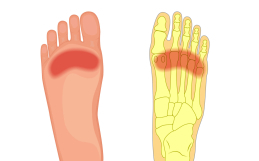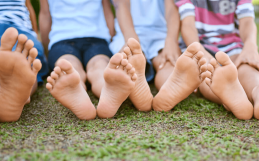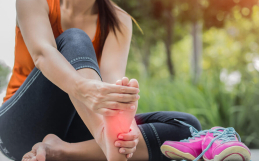If you’ve got a pair of orthotics and you are finding that they are making your feet sore, achy, or cramped, then you may be wondering: why are my orthotics hurting my feet?
It can feel discouraging to find that your orthotics are making your feet sore — but there are solutions!
There are many reasons why your orthotics could be hurting your feet. Identifying the correct reason can help you start to manage your pain and find strategies to reduce it. In this article, we’ll explain some of the top reasons why your orthotics might be hurting your feet and give you some ideas for fixing the problem.
Remember that the best way to figure out why your orthotics are hurting is to book an appointment with one of the Certified Orthotists or Certified Pedorthists att Applied Biomechanics in Guelph. Our team of experts can help with custom orthotics and bracing solutions for a variety of biomechanical problems. Schedule your appointment with us today!
Top 3 Reasons for Painful Orthotics:
1. Your orthotics were not properly fitted or designed, or are worn out
Improper design or fit is one of the top reasons for foot pain from orthotics. If you have an improperly fitting foot orthosis, it is often because you have chosen an off-the-shelf solution that does not fit your specific foot shape correctly. An off-the-shelf solution cannot provide the degree of detail present in with a custom solution — pain may be a sign that you should consider a custom orthotic. It can also be that your orthotics are becoming very worn and need to be replaced.
When getting a new or replacement orthotic, we recommend that you get a comprehensive biomechanical assessment and a clinical gait analysis performed on your foot to fully pinpoint the cause of the pain. Our Certified Pedorthists will be able to take a High Definition 3D laser scan of your feet for an exceptionally accurate picture of your biomechanical alignment. This High Definition 3D laser scan of your feet will be used to create a custom solution that’s right for you.
In addition to the High Definition 3D laser scan of your feet, your Pedorthist will also guide you through a number of different tests to determine range of motion, toe position and callusing, muscle strength, blood flow, and, most importantly, rearfoot and forefoot alignment. This testing and assessment process is used to prescribe the correct solution to your biomechanical challenges.
2. You are using improper footwear with your orthotics
One of the top reasons for foot pain is improper footwear. Footwear that is too cramped or does not have enough support for your feet can result in a range of problems. Your footwear may have been adequate at one point in time, but it may have become too worn or degraded to provide the necessary level of support.
When getting a pair of new orthotics, it is very important that you pay careful attention to the footwear that you’ll be using with them. Ideally, your orthotics should be fitted to work in a specific pair (or several pairs) of shoes, boots, or sandals.
Improper footwear can cause your orthotics to work incorrectly and this can lead to discomfort and can even make the original problem worse. Make sure that you consult with your pedorthist about your footwear when you’re getting new orthotics.
3. You are not breaking in your orthotics properly.
Breaking in a new set of orthotics is an important process that will be different for every person. However, whenever you are breaking in orthotics, we recommend that you take certain break-in precautions to avoid too much discomfort:
- Only wear your orthotics for about 1 hour the first day, then a couple of hours the next.
- If your orthotics do start hurting, stop wearing them and take some time off.
- Make sure that you come back to wearing your orthotics after taking time off — don’t forget about them, or you’ll have to start the whole process over again.
Your goal when breaking in orthotics should be to build up to wearing them full-time after a week or two. We find that it typically takes two weeks for the average person to break in a new set of orthotics.
If you’re not comfortable wearing your orthotics full-time after two weeks, we recommend that you come back and see us. We’ll be able to assess whether your orthotics need to be adjusted to provide a more comfortable fit.
Book an appointment with our team today to get fitted for new custom orthotics.






